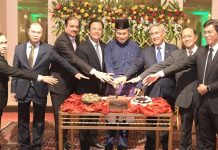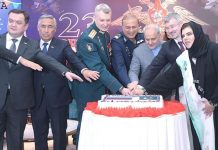LAHORE: Finance Minister Muhammad Aurangzeb said on Saturday that the IT and mineral sectors would be game changers for Pakistan’s economy, with Prime Minister Shehbaz Sharif leading efforts to deliver results soon — drawing parallels with Singapore’s export-driven rise.
He was speaking to the business community at the Lahore Chamber of Commerce and Industry (LCCI).
The finance minister said only nickel had become a major export driver for Singapore with $22 billion worth of share in exports, citing that copper had the potential to yield similar dividends for Pakistan.
He added that global interest in Pakistan’s mineral and IT sectors was growing, with the government focused on removing all barriers to attract and facilitate both local and foreign investment.
“We are here to serve the people. I am visiting chambers to listen, understand and resolve the problems of the business community, and the legitimate demands of the chambers will be accepted.”
“It is crucial that if we cannot repay our country’s investors on time, we cannot move forward. Lowering inflation is essential for economic stability. The interest rate was at 22%; today, it is at 12%,” Aurangzeb said.
The finance czar elaborated that industrial growth was only possible if financing costs and power tariffs were reduced and improved taxation policies were put in place.
Under Prime Minister Shehbaz Sharif’s leadership, he mentioned that the economic direction of the country had clear goals, and positive results would soon be evident.
The finance minister said hurdles to profit repatriation for foreign investors had been addressed, which had boosted their confidence in the Pakistani market.
“We are ensuring that the benefits of reduced inflation directly reach the common man. Middlemen will not be allowed to exploit the system,” he vowed.
While talking about taxation, he admitted the salaried class was bearing the tax burden, as income tax was deducted at the source, and said, “We intend to offer relief to the salaried segment.”
He disclosed that 24 national entities had been earmarked for privatisation, stressing the need for reduced human interaction to resolve systemic issues.
“If we can increase the tax-to-GDP ratio to 13%, we can offer broader relief to various sectors,” he observed. If policies were not having an impact on the common man, then there was no point, he said, citing that edible prices were lowering, and now the middleman couldn’t continue to take benefits.
During the question and answer session, he said the visa issue was discussed whenever the prime minister visited abroad, asserting that this was being resolved on a priority basis.
Aurangzeb further stated that the government would continue to consult with the private sector, which played a key role in running any country. As per the prime minister’s direction, he said a committee had been formed which was working on GSP Plus.
LCCI President Mian Abuzar Shad, Senior Vice President Engineer Khalid Usman, Vice President Shahid Nazir Chaudhry, SAARC Chamber’s Vice President Mian Anjum Nisar and executive committee members also shared their problems and suggestions with the finance minister. Representatives of the Federal Board of Revenue (FBR) and other chambers were also present.
LCCI President Mian Abuzar Shad appreciated government initiatives for the economic revival of the country.
Praising the government’s efforts in curbing inflation and reducing the policy rate, Shad said the reduction in the policy rate from 22% in June 2023 to 12% now was commendable.
“This will ease access to capital for businesses. With inflation dropping sharply from 20.7% in March 2024 to just 0.7% in March 2025, we are hopeful of continued improvement.”
The LCCI president also lauded the “Uraan Pakistan” programme, led by the prime minister, aimed at boosting growth, raising exports to $60bn, attracting $10bn in annual private investment, creating one million jobs a year, increasing renewable energy to 10%, reducing poverty and tackling climate challenges.
He stressed the need for tariff structure reforms to promote industrial growth and recommended adopting a cascading tariff model to ensure raw materials were taxed minimally, encouraging local production and value addition.
LCCI Senior Vice President Engineer Khalid Usman stressed the need to revise the turnover threshold for withholding agents, proposing an increase from Rs100 million to Rs250 million in light of the sharp depreciation of the currency and prevailing economic conditions.
Vice President Shahid Nazir Chaudhry underscored the importance of long-term economic policy planning, suggesting that key economic strategies should be framed within a consistent 10-year roadmap to ensure stability and sustainable growth.

















